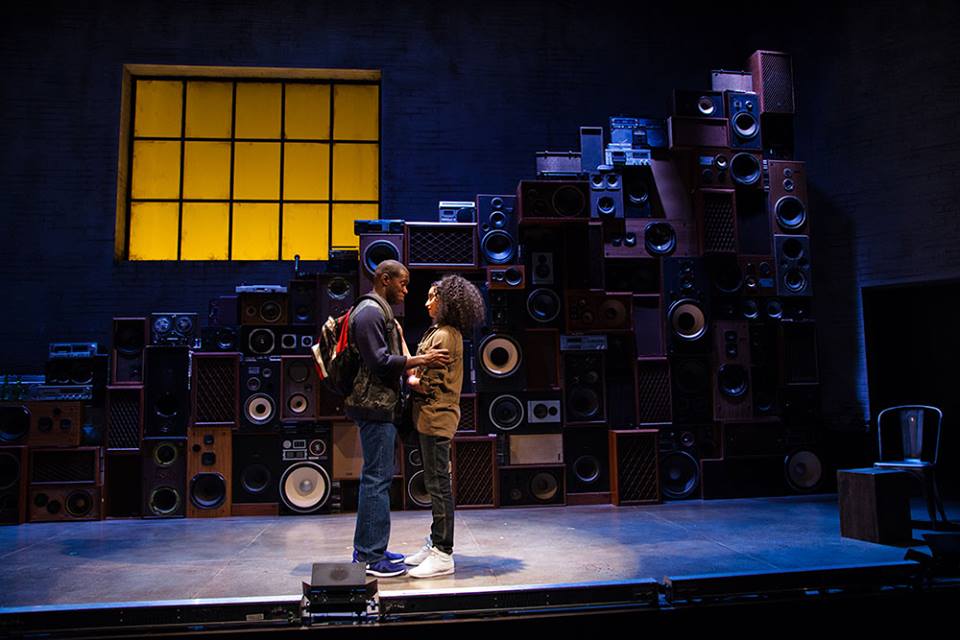
Photo by Meghan Moore.
Presented by Merrimack Repertory Theatre
Written by Idris Goodwin
Directed by Wendy C. Goldberg
March 16 – April 10, 2016
50 East Merrimack Street
Lowell, MA
MRT on Facebook
Review by Craig Idlebrook
(Lowell, MA) The power of hip hop as an art form comes from seizing the rhythm of the moment. The same could be said for The Realness: a break beat play, which is making its world premiere in Lowell. Writer Idris Goodwin has embedded a few dozen profound beats in this play, and it is a beautiful thing to watch when this cast catches one, and then another; the stage crackles to life in these moments. Often, however, it feels like these beats have yet to be uncovered on stage, making this play feel like a work in progress. Rarely do I wish to go back to see a play with the same cast, but I’d like to see how this production grows toward the end of its run in Lowell.
This is a quasi-love story set in the nineties between two tragedies that rocked hip hop. It’s a time when the hip hop world is struggling to define itself as a community. We are introduced to this world through the wide-eyed wonder of T.O. (Terrell Donnell Sledge), an African-American from the suburbs who flees to the city and uses college as a vehicle to study the hip hop underground. He soon falls for Prima (Diomargy Nuñez), a Latina MC who counters the energetic bravado of the male-dominated hip hop world with a biting iciness in her lyrics. Prima is dating Lord Style (Segun Akande), a rising rapper who is struggling to find the right way to break through while still keeping his street cred.
T.O. takes a fake-it-till-you-make it approach to navigating this new world, using his encyclopedic knowledge of hip hop history and a series of lies to open doors, but even as it opens doors he begins to see the limits of this strategy. There is an internal unease that no matter how hard he tries, he can only be a tourist in this world. And this script is at its most profound when it subtly reveals that each of the other central characters is struggling with the same uncertainty in identity.
Sledge infuses the stage with a feverish energy in the opening scene, which certainly captures the audience’s attention even as it threatens to overwhelm the production. He works best when he is tempered in scenes by Nuñez’s laid-back delivery. The energy Sledge brings, even if it is sometimes distracting, helps keep the party going when some scenes would otherwise fall flat.
Director Wendy C. Goldberg and set designer Lee Savage fail to fully capture all that this script has to offer, as they combine to create a world that feels too sparse to provide the catalyst for much of the action. The backdrop is an impressive-looking wall of speakers which seemingly pushes the actors forward, as if they are restricted by the music. However, it would have been good if more work were done to simulate the fun-loving, dangerous chaos of noisy, crowded after-hour clubs or neighborhoods where everyone is on the front stoop. This lack of setup makes the actors’ blocking and actions feel random at times, as if they are running around the stage for no reason.
Still, when the beat hits and the lyrics start flowing, the flaws of this production fade away, and I am thankful as a theatergoer for a chance to bask in hip hop’s turbulent history.
